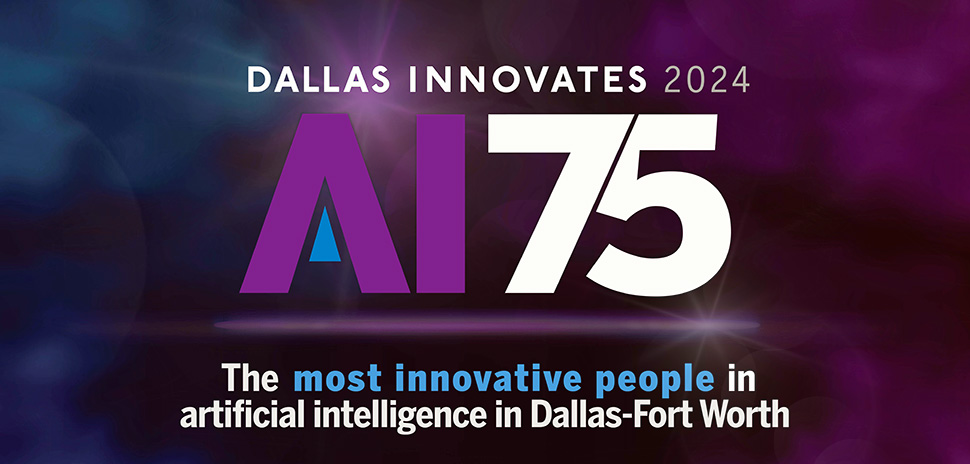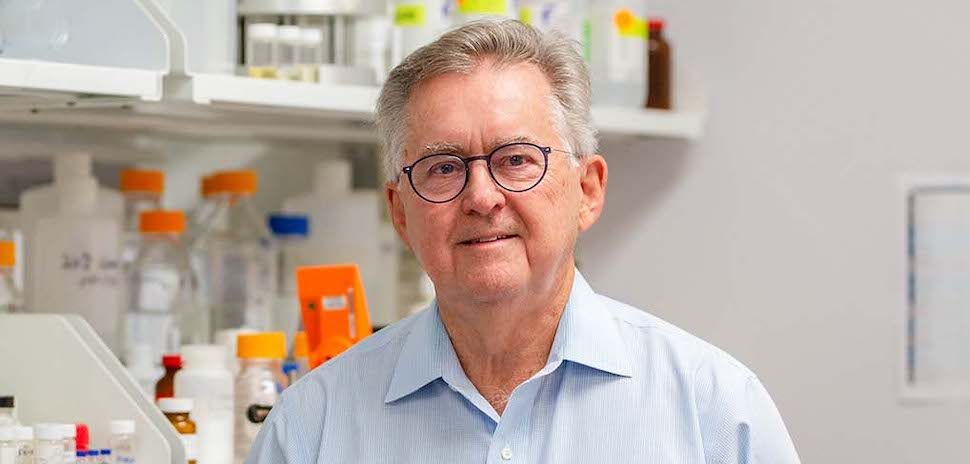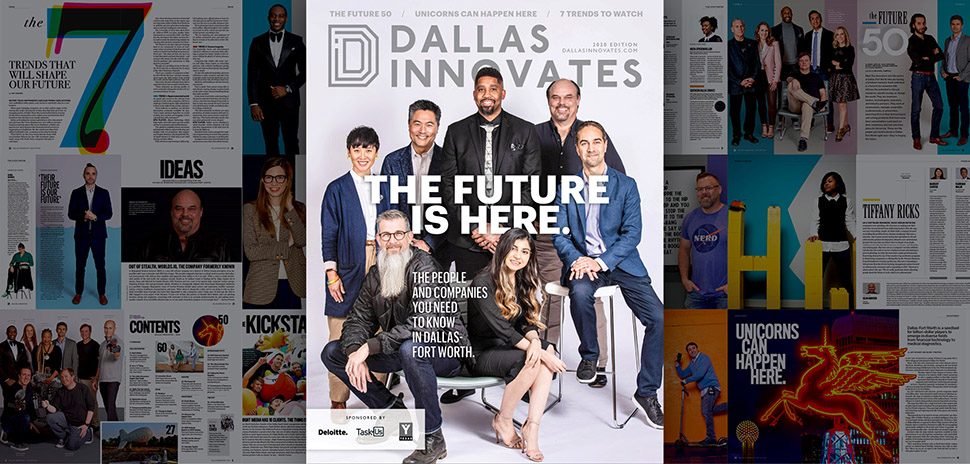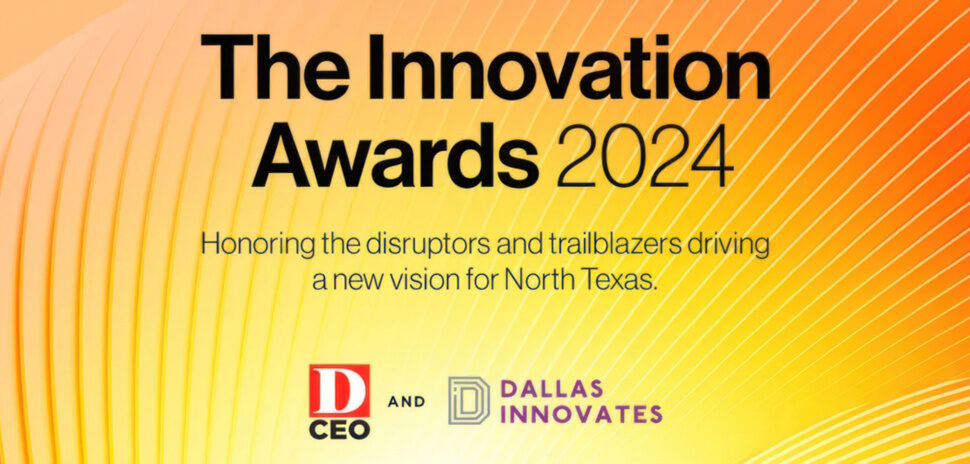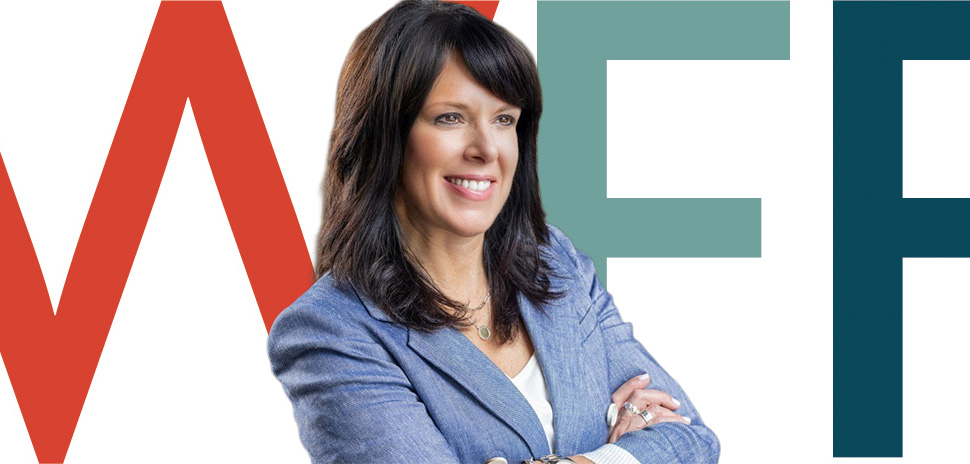From virtual reality training tools to route-planning solutions, the UT Dallas Big Idea Competition has been a launchpad for innovative ideas that have built successful businesses for nearly two decades.
But this year, the University of Texas at Dallas is shaking up its largest pitch competition with big ideas of its own. The competition’s judges—all trailblazers in their industries—will play a bigger role through engaging fireside chats and a nail-biting new prize allocation system that puts more power in their hands.
The research commercialization track has also expanded with its own event and judges, adding a new dimension to the 17-year-old competition.
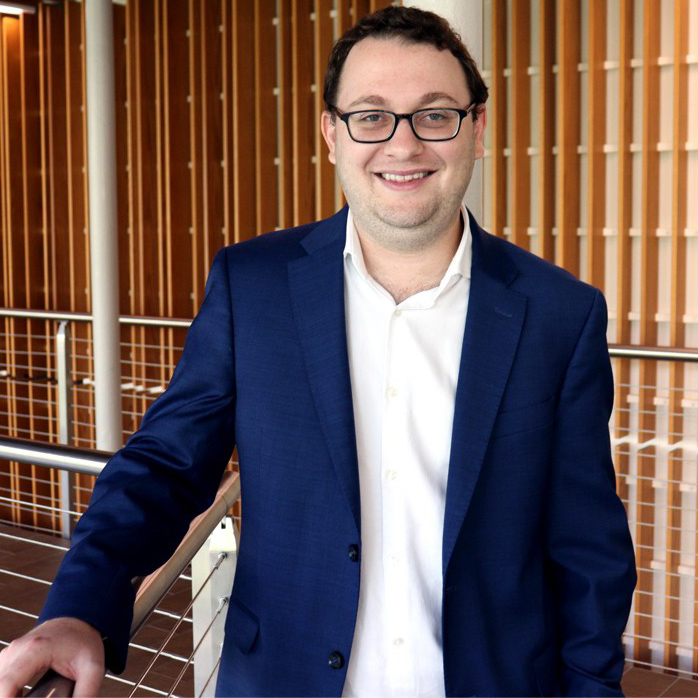
Leon Jacobson [Photo: UT Dallas]
The goal? An even more dynamic event showcasing game-changing startups for students, faculty, alumni, and the community, according to Leon Jacobson, assistant director of UT Dallas’ Institute for Innovation & Entrepreneurship (IIE). But the core mission remains: helping students bridge the gap between concept and market.
The interactive fireside chat will offer a look into the minds of the influential judges as they discuss their own entrepreneurial journeys. The boundary-pushing judges have “amazing stories to tell,” he said. And the revamped judging process adds suspense, with multiple winners possible in each track. “We could have one, two, or three winners—whatever they decide,” Jacobson said.
But it may be the dual event format that sets this year’s competition apart, dedicating a full spotlight to UT Dallas’ research faculty developing cutting-edge innovations, Jacobson told Dallas Innovates.
“I’m surrounded by people smarter than me,” he said, noting the level of research talent the university attracts.
Jacobson knows firsthand the importance of commercializing research from his collaboration with Dr. Ted Price, the director of the Center for Advanced Pain Studies at UT Dallas, on a new venture.
Jacobson, who got his MBA at UT Dallas, is working on his own startup while helping others through his role at IIE.
His experience adds a unique perspective on the value of the competition’s ecosystem. The platform, which connects researchers and students with industry leaders, fosters an entrepreneurial culture while helping transform ideas into market successes, he said, emphasizing the university’s overall aim to support research commercialization.
“It’s about moving innovations from the bench to the marketplace,” Jacobson said.
Here’s a look at what’s ahead—and a view of the Big Idea Competition’s history of successes.
Big Idea Competition 2024 Tracks and Finalists
BIC Research Commercialization Track Final | April 5
The competition, divided into two events, will kick off with the Research Commercialization Track Final on Friday, April 5, at noon at the IQ in Richardson. The event caters to UTD’s research faculty and PhD students, focusing on cutting-edge research with potential for commercialization. The 2024 event, emceed by former Good Morning Texas host Hannah Davis, will showcase research that could have a significant impact in its respective field. Networking and lunch are part of the program.
Finalists, per UT Dallas, are:
Powerwatch AI
Soroush Senemmar (PhD 2024, electrical engineering, Engineering and Computer Science)
Senemmar will introduce a method for real-time condition monitoring and predictive maintenance, including residual useful life prediction, for power system assets. It utilizes current signal features from power systems for monitoring, tracks component conditions, detects abnormalities, schedules maintenance, and predicts residual useful life. Mathematical signal processing techniques are used to extract key features and identify critical aspects. An AI framework analyzes data patterns, detects abnormalities, and evaluates component conditions to inform predictive maintenance plans.
Backstop Neural
Connie Manz (MS 2013, materials science, Engineering and Computer Science)
Manz is developing a spinal cord stimulation (SCS) system with a novel thin film electrode design encapsulated by a softening polymer. The innovation aims to enable neuromodulation of the cervical spine to address the needs of patients with chronic neck and arm pain through thinner leads.
Sancorda Medical
John Yoo (BS 2019, biomedical engineering, Engineering and Computer Science)
Yoo’s automated 3D volumetric meshing software for coronary arteries factors in biomechanics and tissue composition. The approach is noted as being the first of its kind.
Domain expert judges
The judging panel, which will award up to $20,0000, features experts in healthcare, biotech, and science, including Gabby Everett of Biolabs at Pegasus Park; Terry Russell, entrepreneur in residence at UT Southwestern Medical Center, Venture Capital, and CometX program lead; David Stark, former legal head at Teva Pharmaceuticals; Joshua Summer, associate dean, undergraduate studies of UTD’s Mechanical Engineering department; Jovelyn Castellanos from Health Wildcatters; and Dr. Ezekiel Fink, a medical device entrepreneur, neurologist, and entrepreneur in residence for research faculty.
BIC Alumni and Student Track Final | April 17
On Wednesday, April 17, beginning at 5 p.m. at the UT Dallas ATEC lecture hall, the BIC Alumni and Student Track Finals will kick off introductions and a fireside chat with the judges. Then pitches will take center stage. After winners are announced and awards are presented, the evening will cap off with a reception.
Finalists, per UT Dallas, include:
Alumni track
Rick Tett, Glydr
The startup’s foot-controlled video game controller startup allows gamers to use their feet for in-game movement, aiming to enhance the gaming experience by reducing hand strain and adding new dimensions to gameplay. The controller is compatible with various gaming platforms through USB or Bluetooth connections.
Andrew Denton, Prosper AI
Described as a ‘Bumble for Job Searching’ platform, Prosper AI aims to revolutionize the job search process by using AI to match job seekers with potential employers in a more efficient and personalized manner. The platform focuses on facilitating better matches and streamlining the job search process.
Sahil Patel, Pricetect
The startup focuses on streamlining the construction industry’s change order processes.
Student track
Anisha Holla, Foodify
Foodify is described as a “first-of-its-kind matchmaking app” for small restaurants and food influencers on social media. Capitalizing on the power of social media platforms like Instagram and TikTok in modern-day restaurant discovery, the company has helped close-to-failing restaurants stay afloat and empty dining rooms form overnight lines, per UT Dallas.
Ralph Yongoueth,Yongbros
The Roblox game development venture creates captivating games on the popular platform, combining unique mechanics with “strong IP-focused content” to attract millions of players for years to come. By building community and influencers into the fabric of the development process, Yongbros aims to create games that are immersive, memorable, and resonate deeply with GenZ audiences in the metaverse.
Asad Moulvi, StepUp
As a Business Analytics master’s student with a strong foundation in physics, Moulvi has developed StepUp, an AI-powered standardized test preparation tool.
Ananya Sammidi, Sesame
Sammidi, a National Merit scholar at UT Dallas, has created Sesame, an AI-driven digital file organizer.
Good Morning Texas host, fireside chat, and expert judges
Davis will return to emcee the BIC student and alumni track event and lead the fireside chat. The former Good Morning Texas host will talk with the competition’s judges to explore their entrepreneurial and leadership journeys.
The judging panel includes Lynn McBee, CEO of Young Women’s Prep Network; Herb Weitzman, executive chairman of Weitzman; Kevin Lavelle, founder and chairman of Mizzen+Main; and Michael Gorton (MS’88), a 14-time serial entrepreneur and founder of Teladoc.
The competition also features a special award category designed to foster innovative retail startups: The UT Dallas RISE Startup Challenge, sponsored by the Naveen Jindal School of Management’s Center for Retail Innovation and Strategy Excellence (RISE), will award $5,000 to the best retail startup idea from Big Idea Competition applicants.
Fostering innovation from healthcare to transportation to AI business services
UT Dallas is committed to creating an even playing field for entrepreneurs regardless of the industry or type of business idea, Jacobson said.
The competition has seen a broad range of innovative ideas from therapy vests for animals with upper-respiratory illnesses (Olive Tree Therapeutics) to a ticket-resolution and lead-generation tool that uses machine learning (Bonsai).

Winning the Big Idea competition. [Photo: Routora]
Last year’s competition showcased several startups and ideas that were awarded significant prizes. Routora, led by computer science senior Tom Vazhekatt, won the student competition and received $25,000. The startup aims to create faster and more cost-efficient multi-step routes for drivers and has already tested its technology with over 11,000 beta users. The company recently reported saving users “two million miles” of driving.
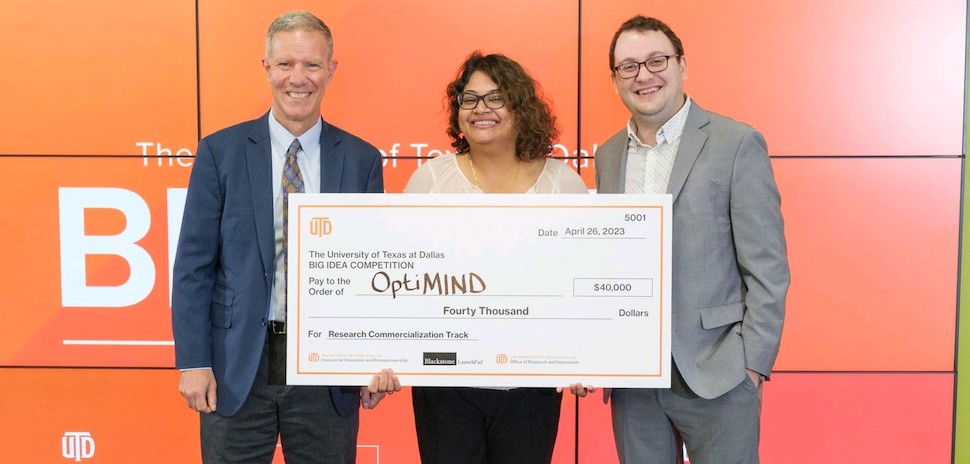
Chandramallika Basak, founder of OptiMIND, with her check from the UT Dallas Big Idea competition. [Photo: Chandramallika Basak/Twitter]
Another notable winner was OptiMIND, which won the Research Commercialization Pitch Track and received $40,000 for its project that uses games to enhance brain health.
BIC also has been praised for its diversity among finalists, with a notable number of female-founded startups making it to the final rounds in recent years. Jacobson noted that four of the 10 finalists last year were women.
A history of startup successes
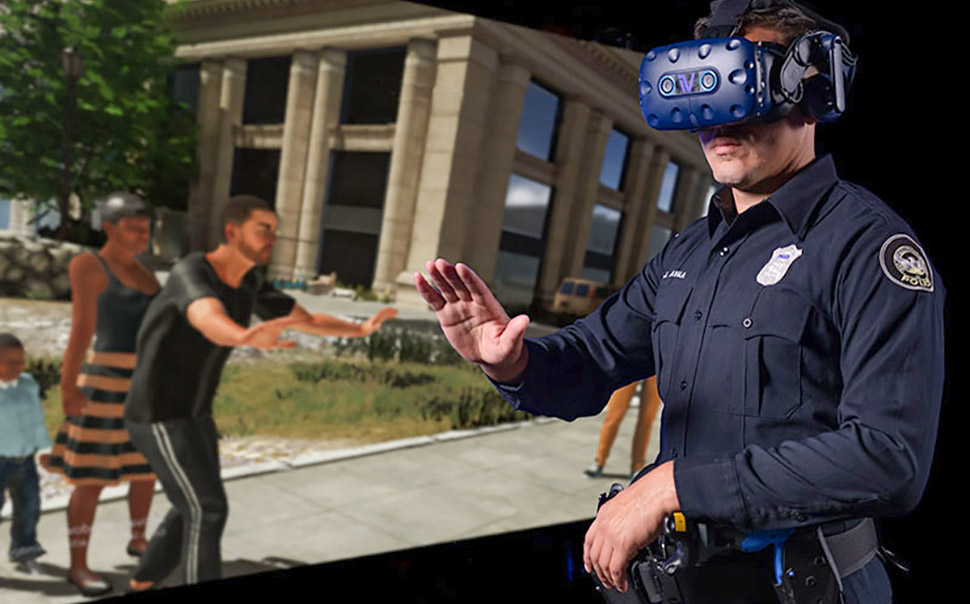
SurviVR, a virtual reality tool that trains police officers, won in its BIC track in 2018. The startup was acquired by InVeris Training Solutions in 2021. [Photo: InVeris]
The competition’s impact extends beyond the event itself, with past winners going on to achieve significant milestones in their entrepreneurial journeys.
![Veena Somareddy, Neuro Rehab VR [Photo: Skyler Fike]](https://s24806.pcdn.co/wp-content/uploads/2019/02/VeenaSomareddy_970-150x150.jpg)
Veena Somareddy, Neuro Rehab VR
Among them, SurviVR, a virtual reality tool that trains police officers, won the top prize in 2018 and was later acquired by InVeris Training Solutions. Another success story is Neuro Rehab VR, which develops virtual reality games for patients recovering from neurological conditions. Co-founded by Veena Somareddy MA’14, a 2017 Big Idea Competition winner, the company has been featured in national publications, including Fast Company, CNBC, and Forbes. Somareddy was also named to Dallas Innovates’ Future 50 in 2023.
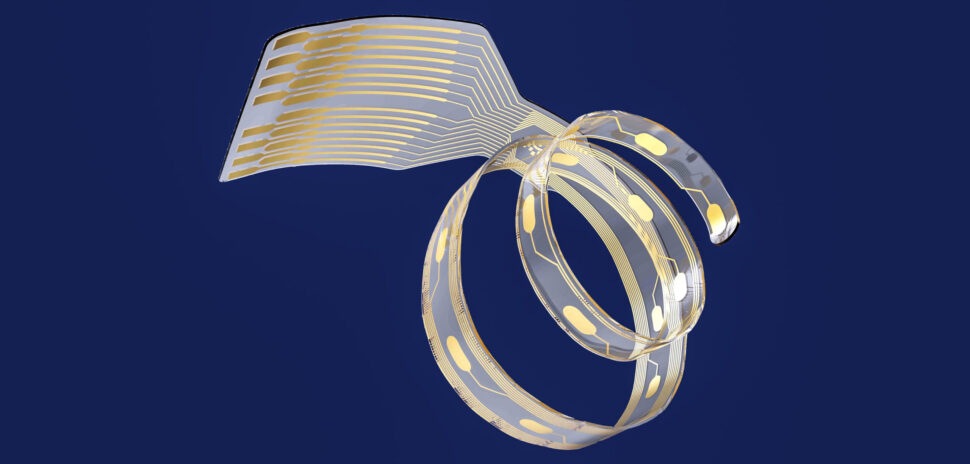
Qualia Oto’s cochlear implant. [Rendering: Qualia Oto]
And in the research commercialization sphere, Qualia Oto, a biomedical device company led by UT Dallas alumnus Benedict Voit, took the top prize in 2021 for its technology for its hearing-assistance devices with a more biocompatible surface.

Benedict Voit, CFO at Qualia Oto
In 2022, Voit, who is now CFO, said Qualia Oto had entered its “next stage of corporate growth” and closed its Series A round of about $1.64 million to begin larger-scale development and testing of its technology. Its novel approach to cochlear implants could restore hearing to those who have lost it, he said.
Jacobson said such successes are why the Big Idea Competition continues to evolve. He wants to see the platform help even more aspiring entrepreneurs to showcase their ideas, secure funding, and receive the support necessary to bring their innovative visions to market.
The competition is an opportunity to make a lasting impact on the lives of students and the broader community, according to the IIE assistant director. “They have an opportunity I wish I had when I was in college, because I definitely didn’t have that,” Jacobson said. “It can make a difference for a lot of the students here.”
For more information or to RSVP for the events
For more information or to RSVP for the research commercialization track on April 5, go here. For the student and alumni track event on April 17, go here
![]()
Get on the list.
Dallas Innovates, every day.
Sign up to keep your eye on what’s new and next in Dallas-Fort Worth, every day.

![Clockwise from left: Andrew Denton, Anisha Holla, Ralph Yongoueth, Ananya Sammidi, Asad Moulvi, Sahil Patel, and Rick Tett will pitch in UT Dallas' Big Idea Competition 2024 student and alumni track finals on April 17. [Photos via UT Dallas and the entrepreneurs; Graphics: DI Studio, istockphoto]](https://s24806.pcdn.co/wp-content/uploads/2024/04/UTD-Big-Ideas-Student-Alumni-Track-BIC2024.jpg)
